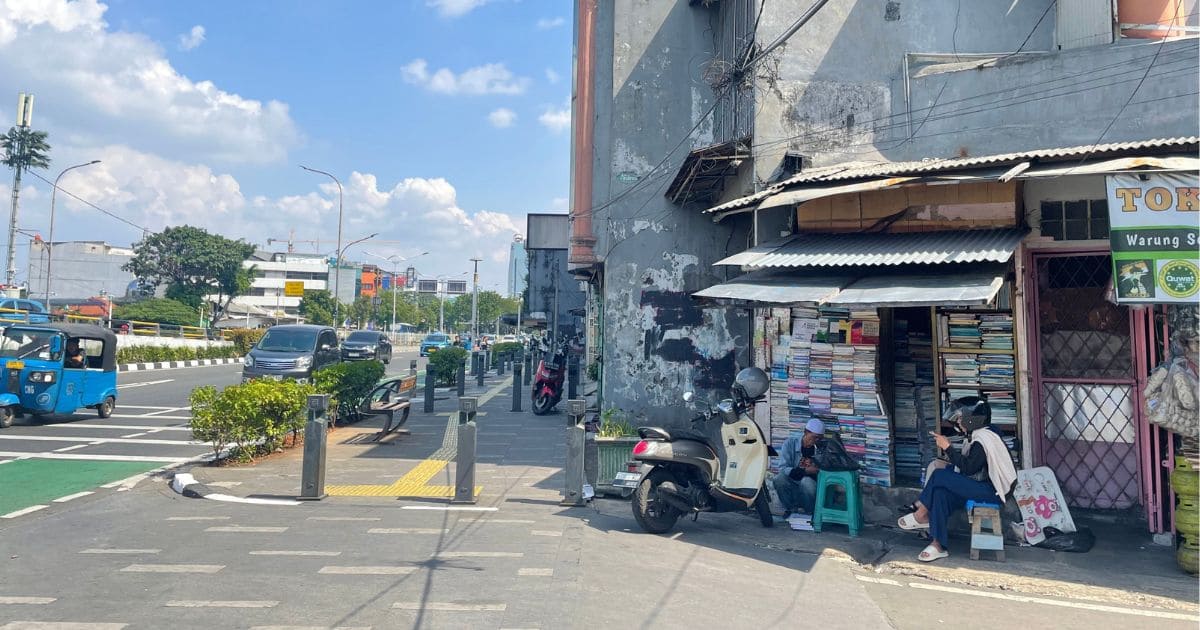The sun was scorching this Sunday afternoon (September 28, 2025). The intersection of Jalan Kramat Raya and Jalan Habib Ali Kwitang in Central Jakarta was quite deserted. The rows of bookstores lining the roadside seemed to be stifling the heat.
Wooden shelves filled with books, some dusty, others haphazardly arranged. There was no bustle of bargaining, no familiar crowds of shoppers, just shopkeepers sitting absentmindedly watching the passersby.
This is the new face of Kwitang Book Market, which was once touted as Jakarta’s ‘book lover’s paradise’.
For the 1980s and 1990s generation, Kwitang was a must-visit place for reading. Hundreds of vendors lined the sidewalks. Students, schoolchildren, and even lecturers often wandered the small alleys in search of textbooks, literary novels, and even rare editions.
In fact, the film “What’s Up With Love?” once immortalized Kwitang as a setting, solidifying its image as the capital’s literary hub. Now, the story is no longer the same.
“When it was the new school year, there used to be queues. People were jostling to find school books. Now there are also new students coming in, but it’s not as crowded as before,” recalled Salmah (52), a trader who has been running her stall in Kwitang for more than four decades, when speaking with Inilah.com.
Today, that scene is a distant memory. Only a handful of shops, less than 10, remain in Kwitang. This weekend, few people stopped by, often just to ask for prices or leaf through yellowed used books.
“We’re used to a day without customers now. Sometimes we just browse and don’t end up buying, but if the book we’re looking for is available, we’ll find it,” said Salmah.
Traders there said their turnover had plummeted by 70-80 percent. They said the internet, e-commerce, and e-books had changed everything.
Another trader, Amir (45), is trying to survive by selling some of his collection through social media or marketplaces. But he admits the challenges are significant, including high operational costs, fierce price competition in online stores, and shipping costs that are sometimes more expensive than the price of the books themselves.
“But if we don’t try, it will get quieter. We actually even created several accounts, because if we didn’t, we wouldn’t know where to take this book,” said Amir.
For them, Kwitang is more than just a place of business. It’s a home, a place where the human connection with books is nurtured directly. Amir admitted that he witnessed the development of the book market in Kwitang, from its early days, to its thriving growth, until it finally became as quiet as it is now.
Despite this, Kwitang hasn’t lost its appeal. For some, especially young people, hunting for used books here is an experience that can’t be replaced by a phone screen.
“For those who like reading, coming here is like having a special moment, you browse every shop, and when you find the book you want and the price is right, it feels more than just happy,” said Aldi (30) in between his chat with the traders.
Book prices in Kwitang vary. Used textbooks and novels can be purchased for as little as Rp 15,000, while rare books can reach hundreds of thousands.
Hunting for books here, they say, is part of the experience of enjoying Jakarta, walking through narrow alleys, smelling the scent of old paper, and enjoying small talk with vendors who know the contents of their shelves by heart.
The Kwitang Book Market may no longer be bustling, but its pulse hasn’t completely died out. It survives, slowly, amidst the onslaught of time.

Comments